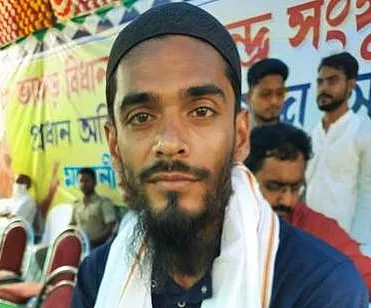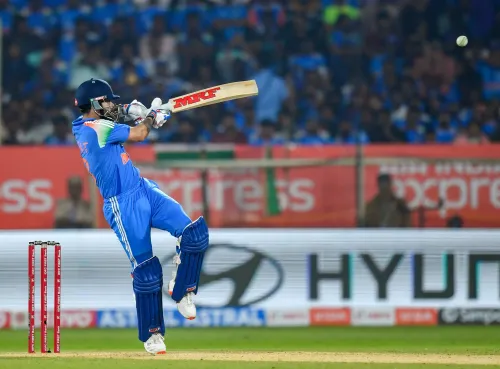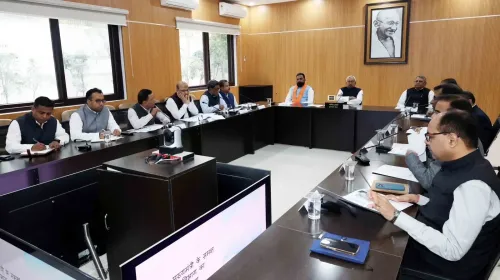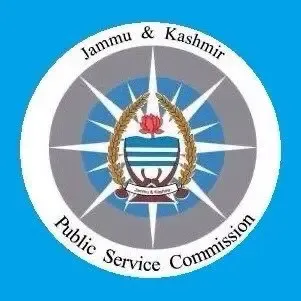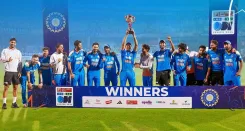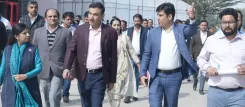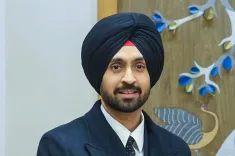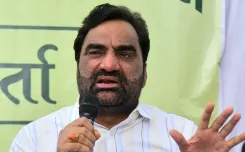What Is Causing Chaos and Conflict in Nepal's Politics?
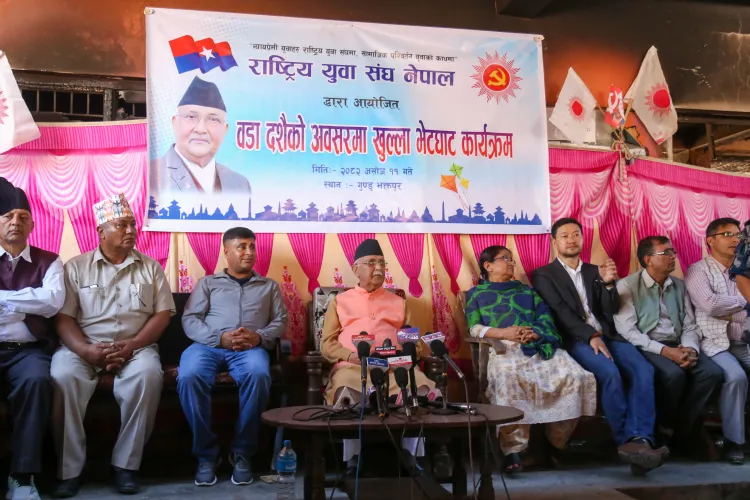
Synopsis
Key Takeaways
- Political tensions in Nepal are escalating with Gen-Z demands for accountability.
- The ongoing protests raise questions about the upcoming parliamentary elections.
- Complaints against former political leaders have been forwarded to judicial bodies.
- The UML party has launched counter-campaigns against current government figures.
- Concerns about public safety and order are at the forefront of discussions.
Kathmandu, Oct 13 (NationPress) The political landscape in Nepal is becoming increasingly volatile as confrontations loom following the Gen-Z leaders' initiative calling for the detention of former Prime Minister K P Sharma Oli and Home Minister Ramesh Lekhak. This demand arises from their alleged involvement in the deaths of 19 protesters during the violent demonstrations that shook the nation in early September.
In retaliation, the Oli-led Communist Party of Nepal (Unified Marxist–Leninist) (CPN-UML) has initiated its own counter-campaign, pressing for the prosecution of Balen Shah, the Mayor of Kathmandu Metropolitan City, who is seen as a pivotal figure in the establishment of the current government led by Sushila Karki, along with Gen-Z leader Sudan Jha.
These escalating actions from both factions raise the specter of conflict and jeopardize the upcoming parliamentary elections scheduled for March 5 of next year, according to various crucial stakeholders.
Recently, some Gen-Z leaders who were at the forefront of the protests that ousted the Oli administration launched online campaigns titled “Arrest KP Oli” and “Arrest Ramesh Lekhak.” Following this, families of those who lost their lives in last month’s protests filed formal complaints against Oli and Lekhak, accusing them of crimes against humanity and State offenses.
In turn, the UML's student faction, the All Nepal National Free Students Union (ANNFSU), submitted a separate complaint against Mayor Shah and Gen-Z figure Gurung, alleging their involvement in the vandalism and sedition witnessed on September 9.
While police have forwarded the complaints against Oli and Lekhak to the High-Level Judicial Inquiry Commission established to investigate the events of September 8 and 9, the commission later clarified that criminal inquiries were outside its jurisdiction and returned the complaints to law enforcement.
“We have received the complaints back from the commission, and we are currently deliberating on the legal actions to take,” stated Superintendent of Police Pawan Bhattarai of the Kathmandu District Police Range. “Similarly, we are also consulting on the complaints filed against Mayor Shah and Gurung.”
Prime Minister Karki is under increasing pressure from Gen-Z factions to detain Oli and Lekhak; however, she risks alienating political parties if she submits to Gen-Z demands ahead of the elections.
Oli maintained a defiant stance during a passionate address at a UML event in Bhaktapur, Kathmandu Valley, on October 9, stating, “Am I afraid of Sushila Karki and running away? What do they think of me?” He remarked on the hardships he has endured in the past under oppressive regimes.
He also criticized Home Minister Om Prakash Aryal, labeling him as an “unknown figure” in need of understanding state governance, while cautioning him against rash actions.
The UML has accused the current administration of seeking revenge against political entities and their leaders, demanding the reinstatement of the House of Representatives, claiming its dissolution was unconstitutional.
In line with the Gen-Z protestors' demands, Prime Minister Karki recommended the dissolution of the Lower House shortly after taking office, which President Ram Chandra Paudel enacted at midnight on September 12.
UML Deputy General Secretary Pradeep Gyawali informed the media following a party Secretariat meeting on Sunday that they have resolved to pursue the reinstatement of the dissolved House.
However, the party has not excluded the possibility of participating in the upcoming elections, insisting that a conducive environment for political engagement must first be established. “Participation can be considered if there is a genuine basis for elections. The government must create a credible environment first,” Gyawali remarked.
While the UML emphasizes the restoration of the Lower House, numerous party leaders during the Secretariat meeting expressed support for electoral participation, with some even calling for Oli's resignation as party leader.
“Many leaders favored electoral participation during the meeting,” stated UML Deputy General Secretary Prithvi Subba Gurung, a former Minister for Communication and Information Technology. “It would be unacceptable to us if police arrest Oli without a proper investigation, as this would jeopardize the scheduled elections.”
He accused the government of prioritizing revenge over electoral integrity.
Leaders from other parties, including the Nepali Congress and CPN (Maoist Centre), expressed readiness to participate in the elections, urging the government to foster a favorable atmosphere.
Despite the current government being formed with the explicit mandate to conduct elections, Prime Minister Karki has yet to take steps to establish trust with established political parties. Instead, she has delegated the ceremonial President to initiate discussions.
On Friday, President Paudel engaged with various political leaders, urging them to participate in the elections “to safeguard the country, constitution, and democracy.” Some attendees questioned the government's failure to consult political parties directly.
A former senior police officer emphasized that while the government was established with the support of Gen-Z protesters, it cannot act solely based on Gen-Z demands without adhering to the law. Former Deputy Inspector General of Police Hemanta Malla stated that arresting political leaders or police personnel involved in the shootings during the protests, prior to an inquiry commission investigation, would merely incite further confrontation.
“Police cannot operate under a chain of command if those allegedly involved in the shooting are arrested before the inquiry commission investigates what led to the firing,” Malla stated.
He added that the vandalism of police posts and the looting of police weapons and uniforms from various locations had demoralized the police force. Enhancing police morale before elections is crucial for ensuring peaceful polling.
According to law enforcement, over 1,200 rifles and pistols and nearly 100,000 rounds of ammunition were stolen amid the protests. Additionally, approximately 15,000 inmates escaped from jails, with some reportedly reverting to criminal behavior. Many weapons remain unrecovered, and thousands of escaped convicts are still at large.
“The government is not concerned about uplifting the morale of police and civil servants but is focused on retaliating against our chairman Oli and others,” accused UML leader Gurung.
Stakeholders cautioned that the stolen weapons and police uniforms could be utilized to jeopardize law and order. They also noted that the destruction of police stations in numerous regions would hinder security operations.
“A demoralized police force cannot manage threats to law and order unless the government enacts credible measures, including providing essential infrastructure and equipment,” Malla concluded.


